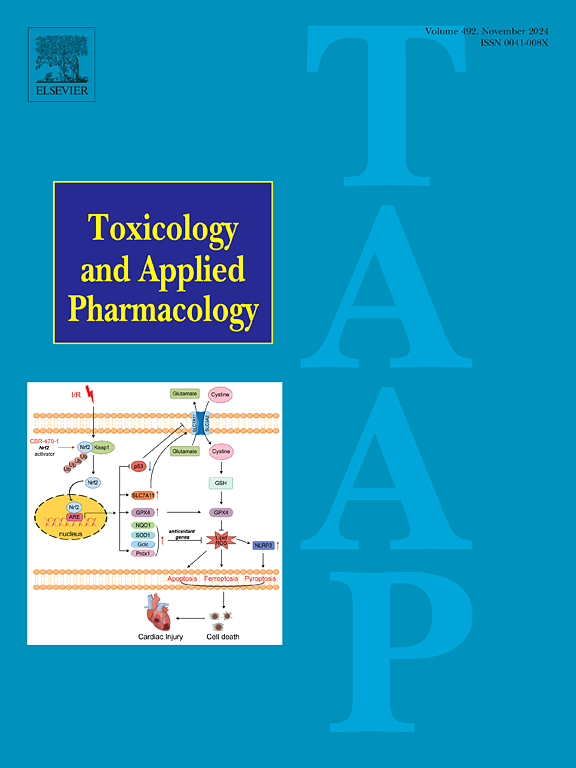USF2 regulates the JAK2/STAT3 pathway through PEX3-mediated SLC25A17 upregulation to affect lipid metabolism and promote the progression of lung adenocarcinoma
IF 3.4
3区 医学
Q2 PHARMACOLOGY & PHARMACY
引用次数: 0
Abstract
Upstream Stimulator Factor 2 (USF2) has been identified as an oncogenic factor in various types of cancer; however, its precise biological function and underlying molecular mechanisms in the pathogenesis of lung cancer remain to be fully elucidated. In this study, we found that USF2 was markedly upregulated in lung adenocarcinoma (LUAD) tissues and cells. Knockdown of USF2 inhibits A549 cell proliferation and invasion and induces cell apoptosis. Overexpression of USF2 promotes abnormal lipid metabolism in A549 cells, as evidenced by elevated levels of triglycerides, cholesterol, and free fatty acids, upregulated fatty acid synthase levels, and downregulated acyl-CoA oxidase 1 levels. Mechanistically, USF2 directly binds to the promoter of Peroxisome biogenesis factor 3 (PEX3) to drive its transcriptional activation. Upregulated PEX3 promotes abnormal lipid metabolism in LUAD cells by interacting with solute carrier family 25 member 17 (SLC25A17) to upregulate its protein levels. Knockdown of PEX3 reverses the effects of USF2 overexpression on A549 cells. Additionally, SLC25A17 overexpression exacerbates lipid accumulation in A549 cells by activating the janus kinase 2/signal transducer and activator of transcription 3 (JAK2/STAT3) pathway, while AG490, a JAK2 inhibitor, eliminates this effect. Finally, a xenograft tumor model was established by subcutaneously injecting A549 cells transfected with sh-USF2 lentiviral vectors into nude mice. Results showed that USF2 knockdown inhibits abnormal lipid metabolism and tumor growth in xenografted mice. In conclusion, our study demonstrates that USF2 overexpression enhances SLC25A17-mediated JAK2/STAT3 signaling by promoting PEX3 transcriptional activation, thereby exacerbating abnormal lipid metabolism in A549 cells and accelerating LUAD progression.
USF2通过pex3介导的SLC25A17上调调控JAK2/STAT3通路,影响脂质代谢,促进肺腺癌的进展
上游刺激因子2 (USF2)已被确定为多种类型癌症的致癌因子;然而,其在肺癌发病中的确切生物学功能和潜在的分子机制仍未完全阐明。在本研究中,我们发现USF2在肺腺癌(LUAD)组织和细胞中明显上调。敲低USF2可抑制A549细胞的增殖和侵袭,诱导细胞凋亡。USF2过表达可促进A549细胞脂质代谢异常,表现为甘油三酯、胆固醇和游离脂肪酸水平升高,脂肪酸合酶水平上调,酰基辅酶a氧化酶1水平下调。从机制上讲,USF2直接结合过氧化物酶体生物发生因子3 (PEX3)的启动子来驱动其转录激活。上调的PEX3通过与溶质载体家族25成员17 (SLC25A17)相互作用上调其蛋白水平,促进LUAD细胞脂质代谢异常。敲低PEX3可逆转USF2过表达对A549细胞的影响。此外,SLC25A17过表达通过激活janus kinase 2/signal transducer and activator of transcription 3 (JAK2/STAT3)通路,加剧了A549细胞中的脂质积累,而JAK2抑制剂AG490则消除了这种影响。最后,将转染sh-USF2慢病毒载体的A549细胞皮下注射到裸鼠体内,建立异种移植瘤模型。结果表明,USF2敲低抑制异种移植小鼠异常脂质代谢和肿瘤生长。总之,我们的研究表明,USF2过表达通过促进PEX3转录激活来增强slc25a17介导的JAK2/STAT3信号,从而加剧A549细胞异常脂质代谢,加速LUAD进展。
本文章由计算机程序翻译,如有差异,请以英文原文为准。
求助全文
约1分钟内获得全文
求助全文
来源期刊
CiteScore
6.80
自引率
2.60%
发文量
309
审稿时长
32 days
期刊介绍:
Toxicology and Applied Pharmacology publishes original scientific research of relevance to animals or humans pertaining to the action of chemicals, drugs, or chemically-defined natural products.
Regular articles address mechanistic approaches to physiological, pharmacologic, biochemical, cellular, or molecular understanding of toxicologic/pathologic lesions and to methods used to describe these responses. Safety Science articles address outstanding state-of-the-art preclinical and human translational characterization of drug and chemical safety employing cutting-edge science. Highly significant Regulatory Safety Science articles will also be considered in this category. Papers concerned with alternatives to the use of experimental animals are encouraged.
Short articles report on high impact studies of broad interest to readers of TAAP that would benefit from rapid publication. These articles should contain no more than a combined total of four figures and tables. Authors should include in their cover letter the justification for consideration of their manuscript as a short article.

 求助内容:
求助内容: 应助结果提醒方式:
应助结果提醒方式:


